September 11 timeline
September 11 timeline
A look at the Harvard community’s reporting, from the tragic day to the lessons learned through experience and hindsight.
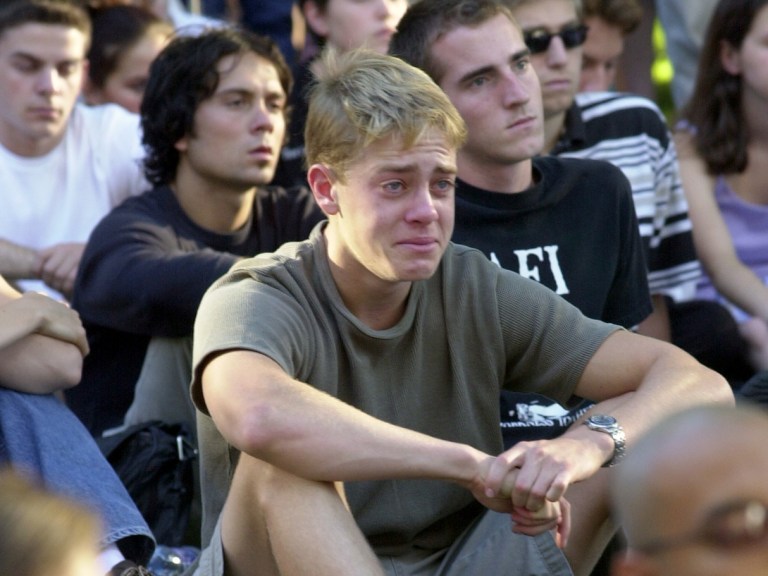
Participants in a vigil outside of Memorial Church in Harvard Yard.
Grief and shock
As the bell of the Memorial Church called the Harvard community to a vigil in Tercentenary Theatre Tuesday evening, its inscription—“In memory of voices that are hushed”—rang as true as its pealing.
“We come together, united by a sense of shock, of sadness, of outrage,” said President Lawrence H. Summers to a crowd of approximately 5,000. “When comprehension fails, we must turn to each other, turn to prayer, turn to faith. We as a university community have a special obligation to try to make sense of events like these that occurred today. Let us commit ourselves to seeking that understanding as a community.”
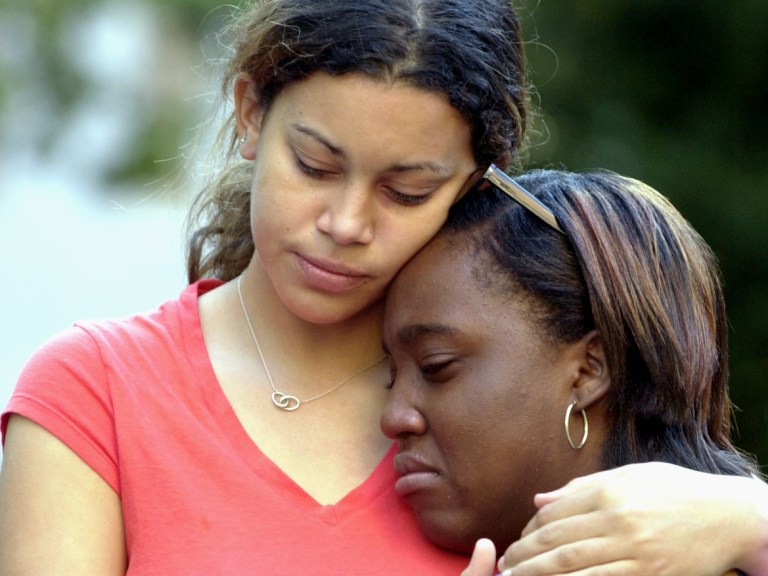
Johanna Paretzky (left) and Kamala Salmon find comfort in community during a moment of silence at Tuesday’s Harvard Yard vigil.
Solace through community
As the horrendous images of devastation at New York’s World Trade Center and destruction at the Pentagon blanketed the airwaves Tuesday, Harvard absorbed the awful news, shook off the shock, and got to work.
It was anything but business as usual, however. At Harvard, as at many universities and businesses across the country, normal functioning ground to a halt. Some classes were canceled and some offices closed, but others kicked into high gear.
The Harvard University Police Department immediately called in more officers to secure different areas at the University and reassure members of the community.
Counselors were ready at University Health Services and the Bureau of Study Counsel, which both established extended walk-in hours for those seeking help dealing with the tragedy. Harvard’s religious leaders reached out to the community in services at several schools, highlighted by a Tercentenary Theatre prayer vigil attended by about 5,000.

The Medical School’s Jay Schnitzer, a member of one of the Disaster Medical Assistance Teams, reflects on the despair—and lessons—of the September 11 tragedy.
At Ground Zero
“That morning, I had been sitting in my office at Massachusetts General Hospital when a staff member poked her head in the door to say that a plane had just crashed into one of the World Trade Center towers. Within moments, everyone in the office was glued to the surreal images on our television screen. By noon, we had received word that all four Boston-based Disaster Medical Assistance Teams were to be deployed to New York. And by six that evening, we were on our way.”
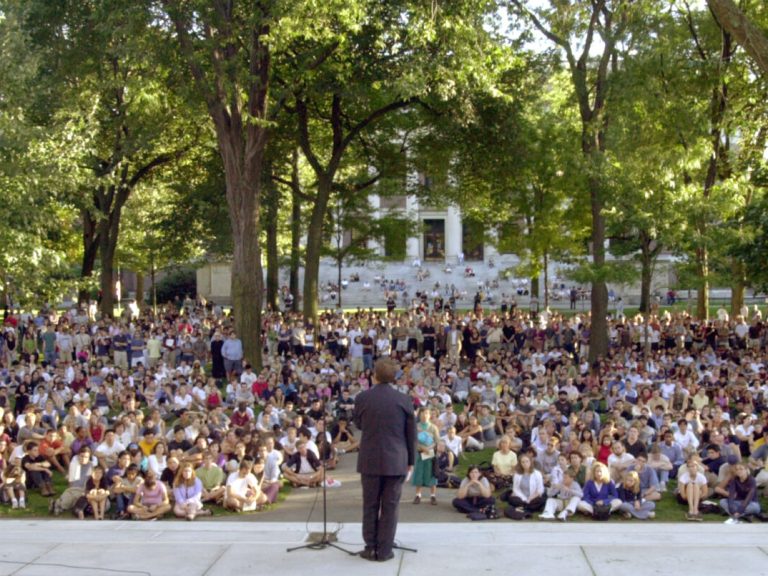
Harvard University President Lawrence H. Summers addressed a crowd of thousands during a vigil for the lives lost during the September 11th attacks.
Coming together
Statement from Lawrence H. Summers
Dear Members of the Harvard Community:
The shocking events of last week leave all of us with a profound and enduring sense of loss. We grieve together for the victims and their loved ones, and we contemplate a world altered by the unspeakable acts of September 11th, even as we do our best to resume our daily lives.
Especially at so trying a time, we must work to ensure that the diversity of our community remains a source of strength and mutual support, not a source of division or conflict. Each of us should be mindful in these difficult days to treat all other members of our community, from all backgrounds, with civility, decency, and respect. Maintaining such a spirit of tolerance will honor the victims of September 11th by affirming the ideals and values that lie at the heart of our university and our nation. It will also help us to sustain an environment in which all of us at Harvard can continue to feel secure and at home.
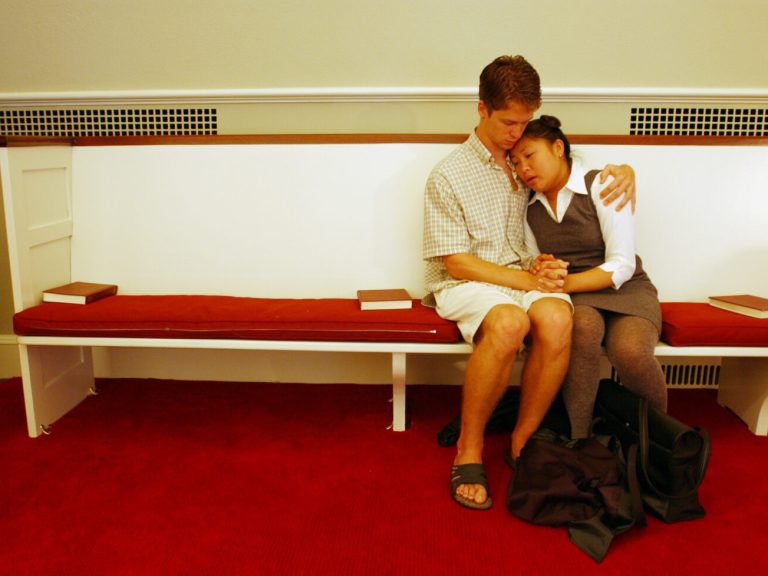
Greg Westin and Melissa Borga linger after a Service of Prayer and Remembrance Order of Worship at Memorial Church.
A time to heal
More than 1,500 people packed a Memorial Church remembrance service on Friday, Sept. 14, capping a week in which the University community mourned the victims and struggled to make sense of the tragic crashes at the World Trade Center, the Pentagon, and in Pennsylvania.
Though emotions ran high, the service was subdued. Worshippers stood along the aisles and walls of the church to hear clergy from Christian, Jewish, Muslim, Hindu, and Buddhist faiths offer prayers for those killed when terrorists crashed hijacked jets into the buildings in New York City, Washington, D.C., and in a field near Pittsburgh.
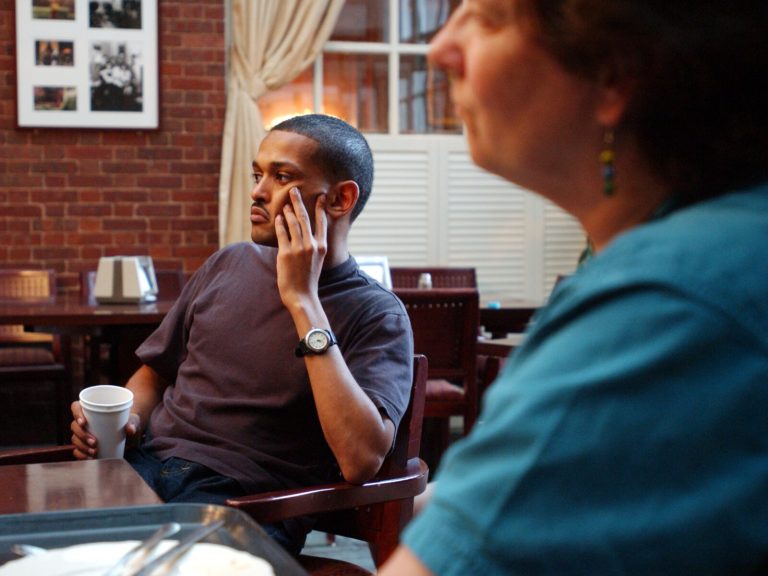
Dagmawi Woubshet and Victoria Macy join the discussion between Harvard students and faculty gathered at the Adams House Conservatory to discuss Islam, the myths that are being propagated, and ways to become involved in and support the Muslim and Arab communities.
Harvard’s Muslim community
When Saif Shah Mohammed came to Harvard as a first-year three years ago, it was the first time he had been in the United States. A native of Bangladesh who grew up in Kuwait, now a senior concentrating in economics, Shah Mohammed says that living in America has affected him profoundly.
“I’ve come to love America in the last three years,” he said. “I’ve come to love the people, I’ve come to identify with this place. When people here grieve, I grieve.”
But on Sept. 11, when terrorists attacked the World Trade Center and the Pentagon, Shah Mohammed found himself in a difficult position.
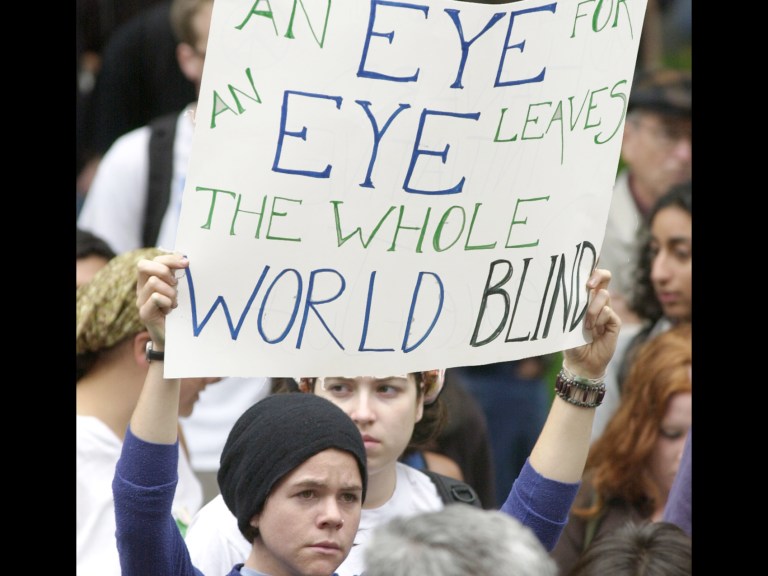
During the rally, Molly McOwen, holds aloft a sign warning against retaliation for the recent terrorist attacks.
Rally for peace
“What do we want? Peace! When do we want it? Now!”
The familiar chant began halfway through a rally of 300 or so in front of Widener Library at noon, Sept. 20.
Brian Palmer, lecturer in the Study of Religion, spoke of the innocent lives that may be lost if America goes to war and asked for “a moment of silent mourning for those who have been murdered and those whose continuing breath is in our hands.”
Tim McCarthy, lecturer in History and Literature, praised those “all over the world who extended themselves,” but deplored those “who are deploying rhetoric and deploying troops without thinking before they speak.”
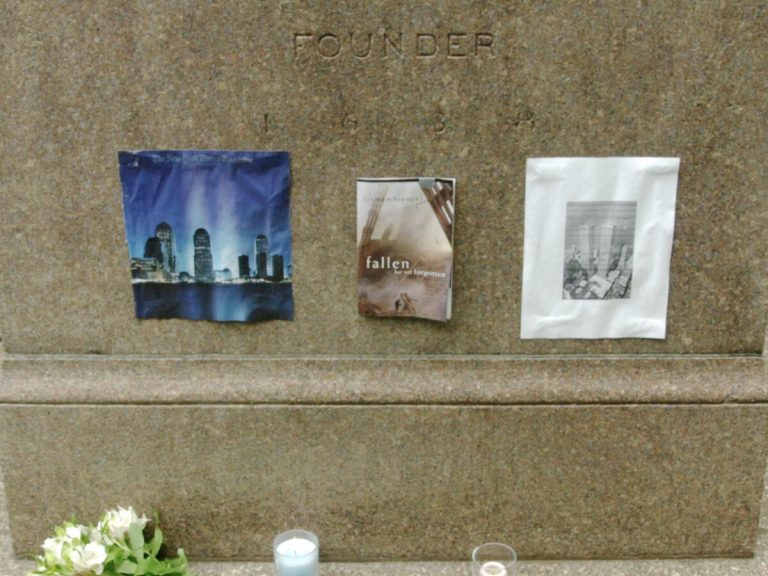
Memorial at John Harvard Statue
Its poignancy is its simplicity. Three candles, snuffed out. A bunch of irises, white and speckled red on long green stems, kept fresh by the recent rains. A bit of tree branch, leaves slowly yellowing. And an origami crane, symbolizing long life and happiness, fashioned from foil.
And taped to the base of the John Harvard statue above, three pages with photos of New York: showing the World Trade Center towers as they stood on Sept. 10, as their crumbled wreckage stands today, and as the New York skyline looks now – empty.
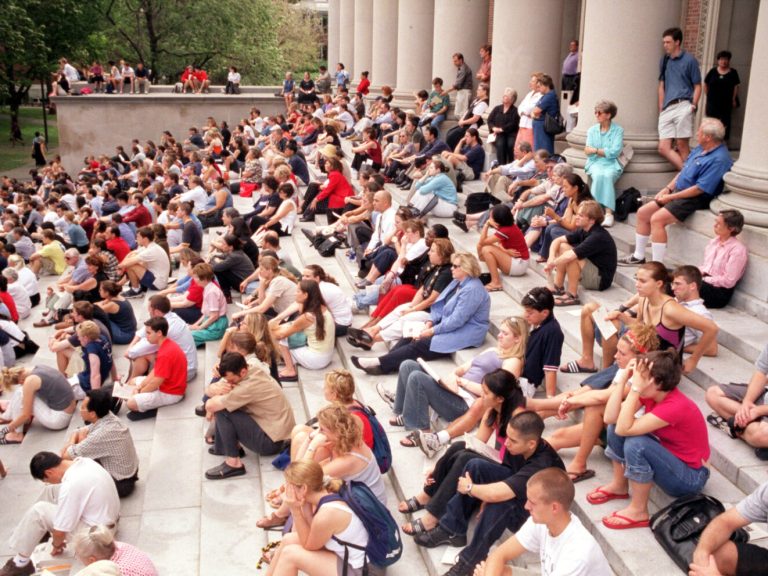
One year after
More than 10,000 members of the Harvard University community gathered in Tercentenary Theatre at noon on Sept. 11 to mark the one-year anniversary of the Sept. 11 attacks. With words, music, and prayer, students, religious leaders, and President Lawrence H. Summers honored the day’s tragic events and offered messages of peace and hope.
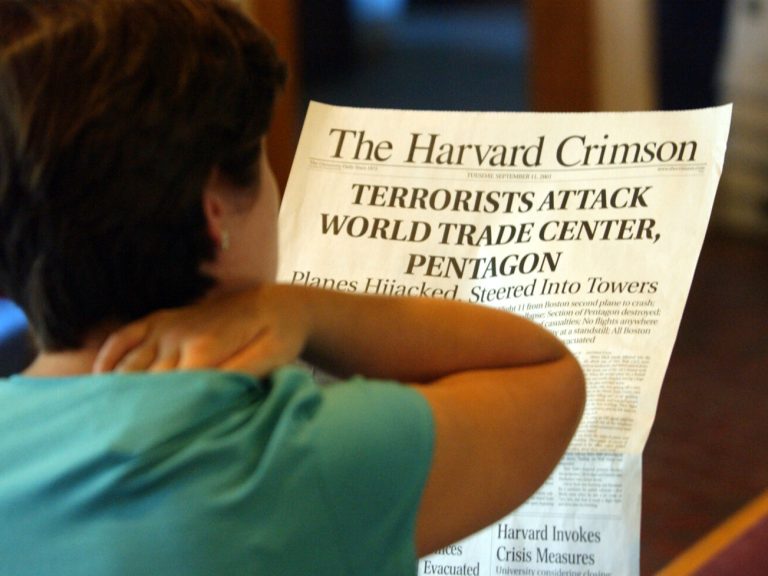
Remembering 9/11 on the 10th anniversary
“In just a few weeks, the world will mark the 10th anniversary of the Sept. 11 attacks, a fitting time to come together as a community to reflect, to mourn, and to consider the ramifications for the survivors, the nation, and the world,” wrote Homi Bhabha, the Anne F. Rothenberg Professor of the Humanities, in a letter to the Harvard community.

It’s time for diplomacy
U.S. policymakers should use the 10th anniversary of the 9/11 terror attacks as an opportunity to shift from a military-driven “global war on terror” to a policy built more on diplomacy, outreach, and persuasion, panelists told a Harvard Kennedy School audience.
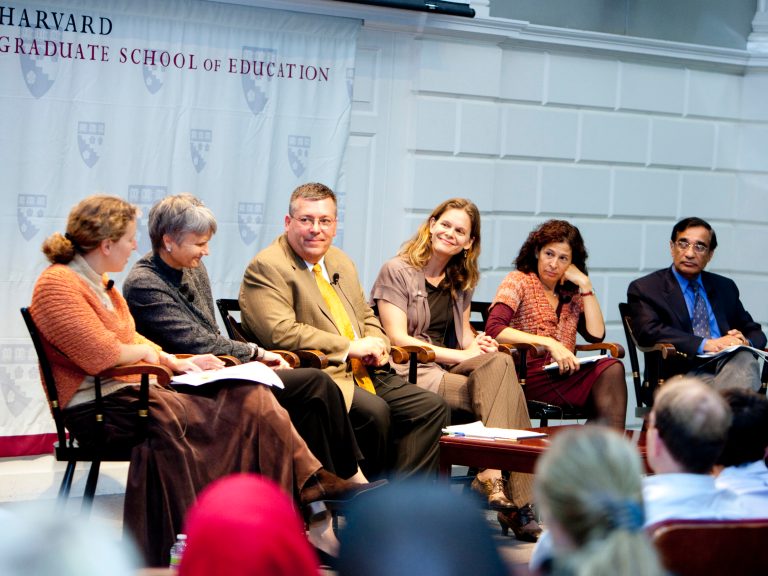
Teaching a tragedy
During a discussion held at the Harvard Graduate School of Education (HGSE) on Wednesday, the panelists said that a broad cultural and religious literacy, a historical context, and a focus on empathy are all important elements when bringing the sensitive topic to the classroom.

‘Why do they hate us?’
The Sept. 11, 2001, terrorist attacks created a sense of vulnerability in the United States that still persists, that transformed the nation’s Muslim community from unseen to a suspected enemy within, and that prompted actions that one expert predicted will be viewed by history as moral failures.
That was the sense of a panel discussion on Thursday in Harvard’s Boylston Hall. Duncan Kennedy, the Carter Professor of General Jurisprudence at Harvard Law School and a member of the panel, said the attacks were not just devastating because of the horrific loss of life, but also because of the difficulty Americans had in understanding them. That was captured, he said, in the question commonly repeated after the attacks: “Why do they hate us?”
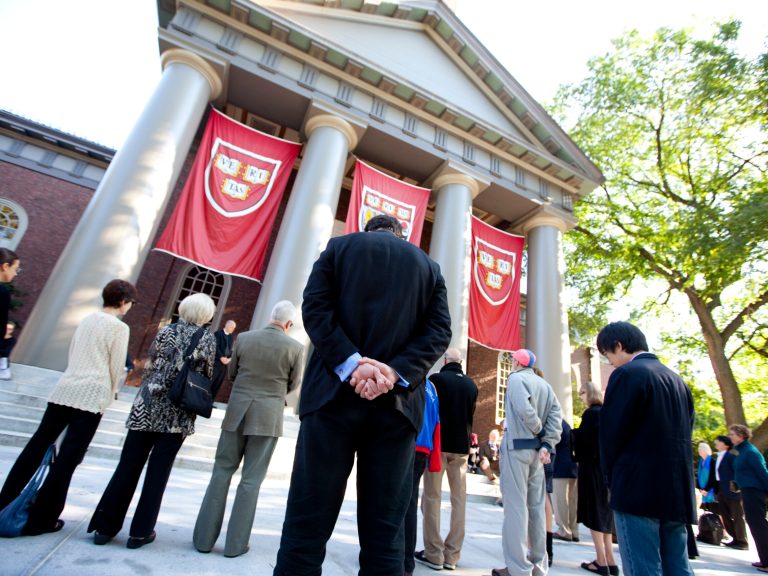
Moment of interfaith prayer and reflection
On the 10th anniversary of the attacks, Harvard students, faculty, and staff joined in remembering that tragic day and the darkness it brought — and the light it may someday bring. They created an eclectic set of events and installations to remember these Harvard graduates and the other victims of terror and the heroes responding to it worldwide in the past decade.
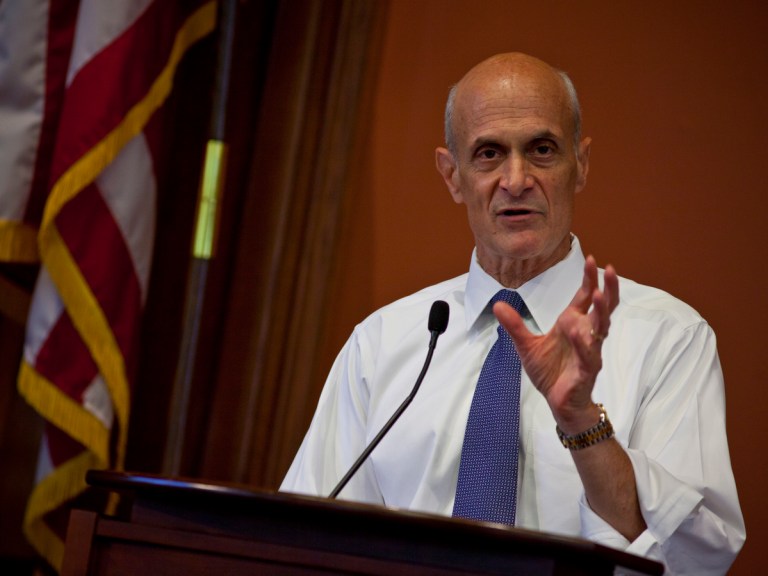
The law before and after 9/11
Michael Chertoff had a common reaction to the news of a plane hitting one of the World Trade Center towers in New York City on Sept. 11, 2001.
“Like many people at the time, I thought it was a pilot error,” the former U.S. secretary of Homeland Security told a crowd at Harvard Law School.
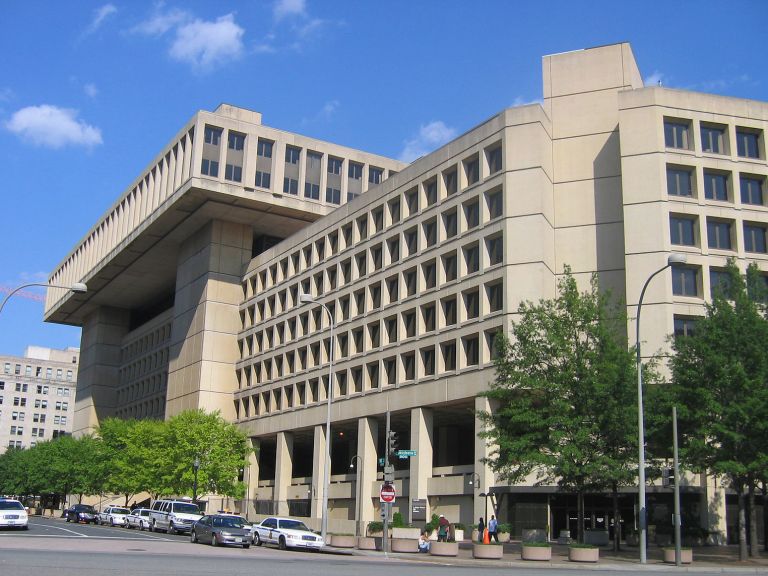
How the FBI reinvented itself after 9/11
Since its founding in 1908, the organization had focused primarily on solving domestic crimes and bringing criminals to justice. But in the wake of 9/11, President George W. Bush expanded the FBI’s mission with a single question: What was the FBI doing to prevent the next terrorist attack?

A nation shocked, haunted, changed
Many of the rituals and ceremonies determining how America mourns its fallen trace back to the Civil War, when the country was overwhelmed by death on a massive scale.
Those rituals are reflected in the way we honor the nearly 3,000 who died in the 2001 terrorist attacks, Harvard President Drew Faust said Wednesday at the National September 11 Memorial and Museum in New York.
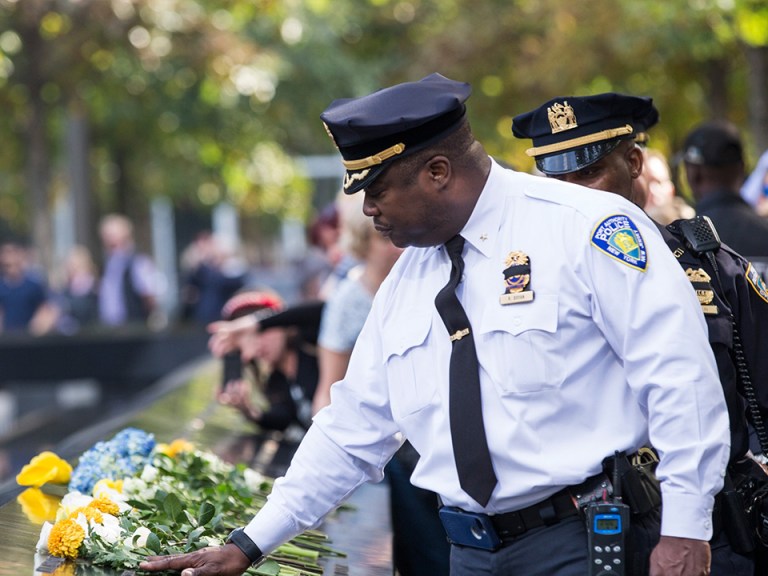
What’s better and what’s worse 20 years after 9/11?
Kennedy School faculty members reflect on how the September 11 attacks have changed our world.
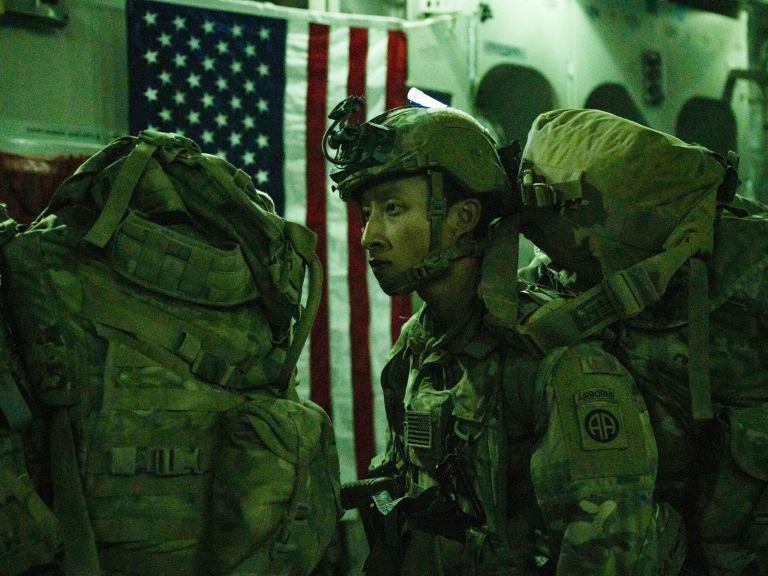
Hard lessons from 9/11
Harvard professors detail how it reshaped homeland security, foreign policy, the study and treatment of PTSD, and crisis planning and management.
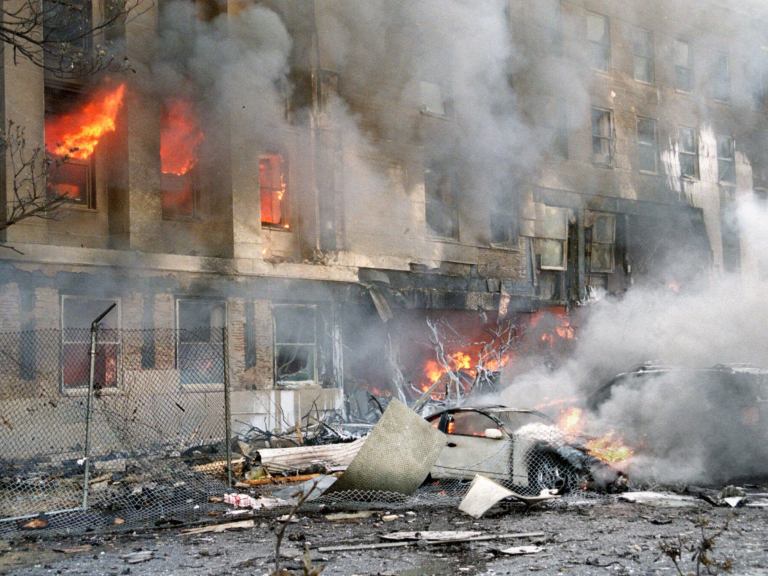
Where were you when it happened?
Faculty and staff from across the University reflect on the day and the aftermath.
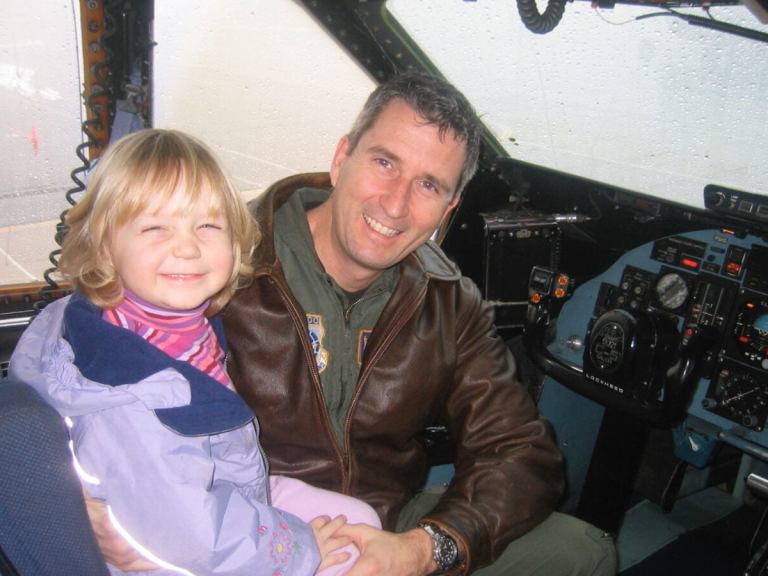
A young Caitlin Beirne ’24 with her father in the cockpit of a plane. Her father was deployed to the Middle East following 9/11.
Growing up in the shadow of the day
Many Harvard College students are among the nearly quarter of the American population who were either not alive or are too young to remember the day or how different a place the world was before 9/11.
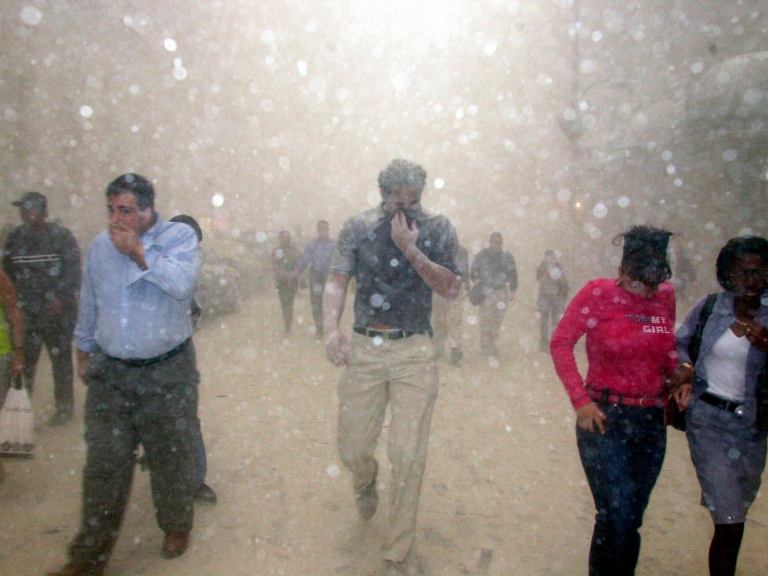
Risking and reporting
Jill Radsken opened her notebook, ready for a day of high fashion. Then, mayhem.
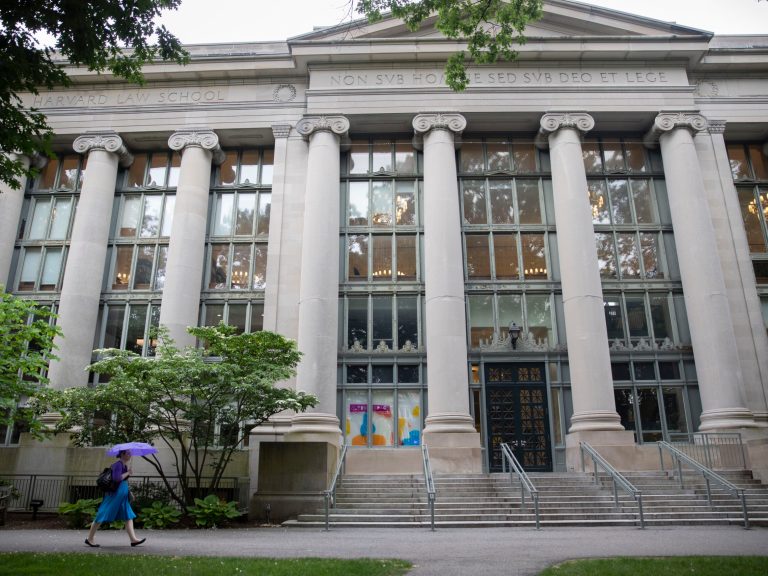
The law and the disorder
Law School affiliates share their reflections about the events of 9/11 and what they view as the greatest threats today.

Remembering September 11
Members of the Harvard T.H. Chan School of Public Health community recently reflected on where they were on September 11, 2001 and how their lives—and public health—have changed.
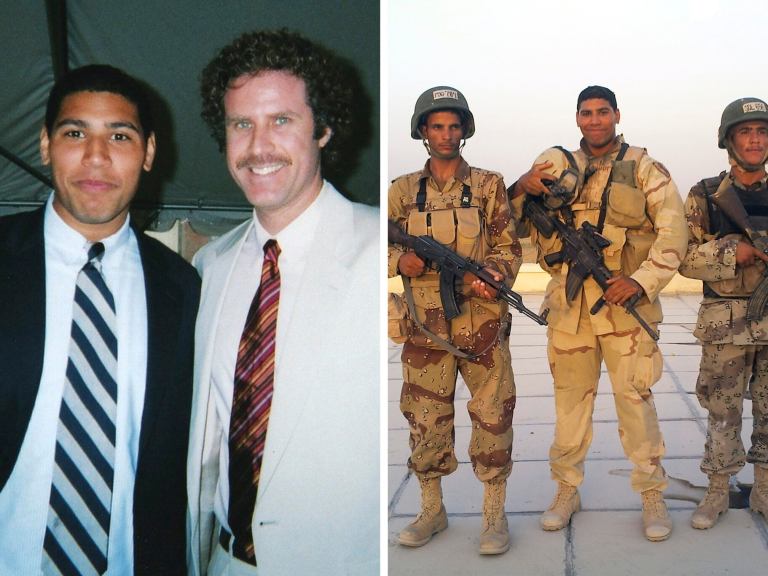
Choosing a concentration
Joe Linhart celebrated his Harvard graduation with Class Day speaker Will Ferrell 18 months before deploying to Iraq with the U.S. Army, where his service included training of Iraqi soldiers.

‘We were very grateful just to see all of us back here alive.’
Former students recall the confusion and fear of 9/11, the desire to do something, and the sense that everything would be different now.
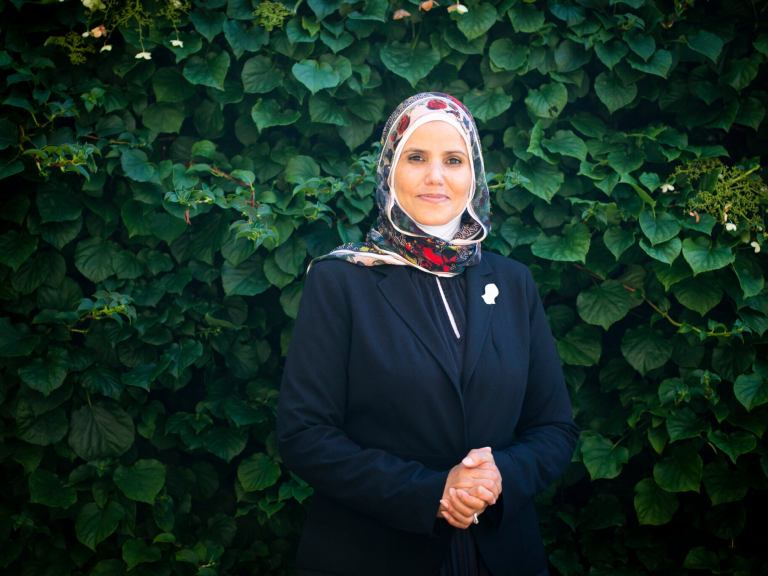
Born to take on Islamophobia
“After Sept. 11, everything around you made you feel that you didn’t belong here,” said Samia Omar, Harvard’s first Muslim woman chaplain.

‘I never saw a survivor’
Minutes after David Battat responded to the 9/11 attacks on the World Trade Center as a volunteer firefighter, the north and south towers collapsed around him. Battat, a 1991 graduate of Harvard College, spent the next four days searching the site for survivors.